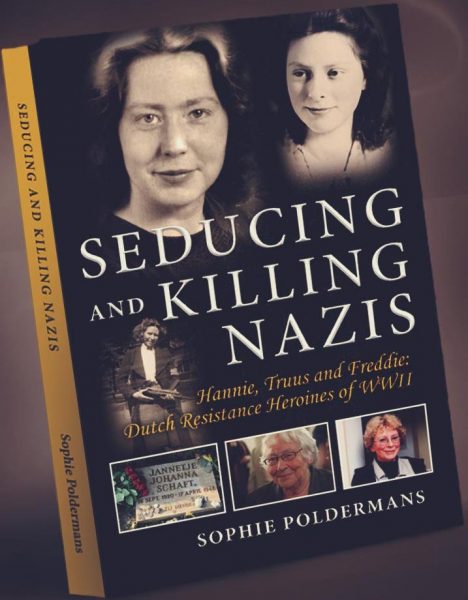
I recently recorded Seducing and Killing Nazis by Sophie Poldermans, the astonishing true story of three teenage Dutch girls, Hannie Schaft (19) and sisters Truus (16) and Freddie (14) Oversteegen. These young women literally took up arms against the Nazis in World War II, and their courage to stand up for what was moral in the face of of mortal danger was deeply inspiring. We must not forget the lessons of WWII, especially while fascism and authoritarianism are making a comeback across the globe. Sophie was generous to offer me some insight into how she came to write the history and story of these three brave leaders
Q: What’s your background? Who or what inspired you to have an awareness of or interest in social justice?
A: My background is in international criminal law and human rights law with a focus on the role of women in war. Values like justice, peace and equality were instilled in me when I grew up. From an learly age, I have been fascinated by wars and the fact that people are apparently capable of committing horrible crimes. At the same time I have always been looking for strong female role models who show genuine leadership. Then, when I had to write a research report in high school for my history class on a self chosen topic, that topic was obvious to me: Hannie Schaft. (Female Dutch Resistance fighter, executed by the Nazis only three weeks before the end of the war. She became the icon of female Dutch resistance, famous in the Netherlands like Anne Frank). I was a teenager myself (16) growing up in the same city as Hannie Schaft, Haarlem (12 miles west of Amsterdam), but luckily under completely different circumstances. I dived into the matter very seriously, interviewed Truus Oversteegen who was still alive at the time and she introduced me to her sister Freddie. They trusted me with their story and a special bond grew from there.
Q: What do you hope listeners learn from your experience in telling the story of Hannie, Freddie, and Truus?
A: Never to forget the horrors of WWII and to derive lessons from WWII and this particular story. Knowledge about WWII is fading especially since the people who actually lived through the war are dying. At the same time we see a shocking increase of Holocaust deniers. Moreover, the role of women has traditionally been underrepresented or neglected in history. That is why this story is of utmost importance. We can learn from the lives and resistance work of these three young women (the very few women in the world who took up arms against the enemy), recognize them as positive role models and genuine leaders and last we can reflect and ask ourselves the difficult but important question: “What would I have done if I had been in the shoes of Hannie, Truus or Freddie?” and translate this story in today’s world and everyday life.
Q: You’ve studied this painful period in Dutch history now for much of your life. What are the parallels you see in America 2020 compared to Europe in the 1940’s?
A: Throughout history you can see that, often triggered by some type of (alleged) crisis, the rights of certain people or (minority) groups are under pressure. The underlying emotion being fear of the unknown and/or the feeling that the power of those in charge is threatened. This results in exclusion of people or groups, depriving them of basic human rights. That happened on a major scale in WWII with Jews, homosexuals and non-arians. In today’s world the position of refugees, migrants, women, LGBTQ and non-white people is wobbly and we see an increase of anti-semitism, islamophobia and xenophobia. This happens not only in the US, but also in Europe and globally.
Q: What can young women, and young men, do to deepen their empathy and develop courage? Can courage be cultivated?
A: It all starts with awareness. It is vital that everybody and especially the younger generation will be educated and become aware of the dangers of discrimination and exclusion. WWII didn’t start with the gas chambers, it started with exclusion. In our everyday life we see discrimination and exclusion in society, at work and even already in kindergarten. Courage is to respect others, to think for yourself and to stand up for others. Courage is to not only embrace ideals like justice, peace and equality but also to live up to these standards and encourage others around you to do the same. Don’t look away, but take responsibility and stand up for human rights and try to remain human at all times, especially in times of inhumanity.
Q: Where will you go next? What’s your goal with your work, including as a writer and a speaker?
A: My goal is to shed light on the role of women in war in the broadest sense of the word in order to educate people about war, justice and peace, women’s and human rights, to provide positive female role models and to provide examples of inspirational genuine leaders in my book(s), lectures and speeches. Awareness is the first step toward understanding people and society, and it is crucial to learn from (earlier) mistakes. Knowledge and education can function as a form of empowerment and as a catalyst for hope and change, serving as a gateway toward human connection and global understanding.
For more information and to purchase the book:
https://seducingandkillingnazis.com
For more information on Sophie Poldermans:
Book available through https://seducingandkillingnazis.com and Amazon in paper back, eBook and as audiobook through all the audiobook channels.
Short author bio:
Sophie Poldermans is the author of “Seducing and Killing Nazis. Hannie, Truus and Freddie: Dutch Resistance Heroines of WWII” (2019). She is the founder of “Sophie’s Women of War,” is a Dutch women’s rights advocate, author, public speaker, lecturer and consultant on women and war. She personally knew Truus and Freddie Oversteegen for 20 years and worked closely with them for over a decade as a board member of the National Hannie Schaft Foundation. Please check out https://sophieswomenofwar.com or https://seducingandkillingnazis.com.



